Should You Weigh Yourself Every Day?

Being in a calorie deficit is the one thing you need for weight loss.
But how often should you be weighing yourself to track your progress?
If you ask 10 people, you’ll probably get 10 different answers.
You should weigh yourself every day.
No, once a week is fine.
You really don’t even need to weigh yourself at all.
Everyone has their opinion.
And ultimately, how often you weigh yourself is your prerogative.
But if you want the most accurate way to track your weight loss progress, in my humble opinion, you should weigh yourself every day.
In this article, I’ll explain why.
How much does your weight fluctuate in a day?
Before we get into why you should weigh yourself every day, I want to make you aware of something…
The fact that weight loss isn’t linear.
You expect weight loss to be like this:
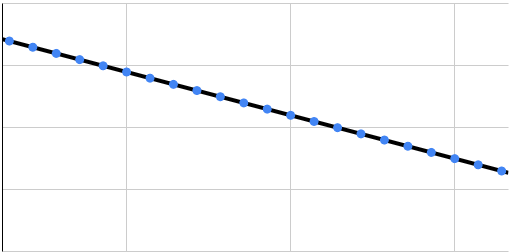
But realistically, it’s going to look more like this:
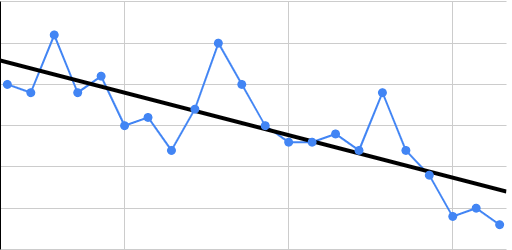
As you can see from the second picture, weight loss doesn’t just occur in a straight line down.
You weighed in today at “X” amount?
Well, tomorrow, the scale might be up a few pounds like you gained weight overnight, even if you did everything right.
It’s important to not get freaked out by those inevitable daily weight fluctuations.
The truth about weight loss is they’re totally normal.
Most of them are just due to water retention.
For example, a heavy strength training session or eating more carbs or sodium than normal can cause your body to hold onto more water, which shows itself via a higher number on the scale.
That means the scale won’t always be a true reflection of the progress you’re actually making so don’t look at your weight as the be-all-end-all.
When is the best time to weigh yourself?
When to weigh yourself… Morning or night?
In my opinion, the best time to weigh yourself is in the morning on an empty stomach right when you get up.
And no, you don’t have to follow this up with fasted cardio if you don’t want to (it won’t lead to greater fat loss).
Weighing yourself first thing in the morning on an empty stomach makes for an even playing field and provides the most accurate reading.
If you were to wait until later in the day or at night, so many factors can throw things off (i.e. the amount of food you have in your stomach, your workouts, your daily movement, etc).
Weighing yourself daily vs. weekly vs. monthly
Now, we’re going to talk about why I believe you should weigh yourself every day.
I want you to picture the following scenario:
You’re in school.
During the semester you get participation points for class attendance that go into determining your final grade.
How would you expect the teacher to calculate your participation score?
You’d want them to take attendance on all the days, right?
Well, yeah…
Doing things that way would give them the most accurate sense of how often you attended class.
You wouldn’t want them to choose just one day out of the week or month and use that to determine your ENTIRE class attendance score.
If your professor did that, they might just pick the one day out of the week or month you happened to miss class, and that wouldn’t be fair.
Maybe you got sick, had a doctor’s appointment, or something like that.
You’d get a low participation score, even though you were there on all the other days.
What if we took that same logic and applied it to weight loss?
You can either:
- Weigh yourself every day, which paints a more complete picture of your progress and helps you identify trends to let you know you’re headed in the right direction.
- Weigh yourself every once in a while, which may not tell the whole story about how you’re truly progressing.
Let’s think about it now in terms of weight loss.
Which option sounds better to you?
I’m willing to bet you like option #1.
Take a look at the data below.
I’ve intentionally blanked out the rest of the days.
If you just did weekly weigh-ins, it would look like you’ve gained a pound from the 1st to the 8th.
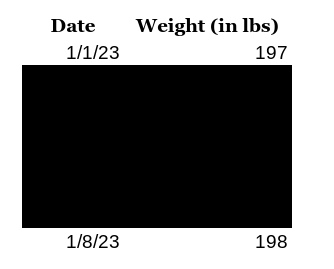
Now, here’s what the rest of your weigh-ins looked like for that week:
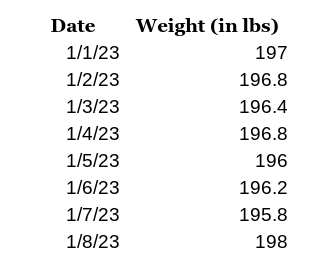
Do you see how the overall trend is downward?
That’s what matters.
Your weight just happened to spike up on the day you did your weekly weigh-in.
As we’ve talked about, your weight fluctuates day-to-day for a variety of reasons.
And none of them mean you suddenly put on a whole bunch of extra body fat, or aren’t making any progress.
In a nutshell:
When you don’t weigh yourself every day, it’s like trying to finish a puzzle and make out the picture without all the pieces.
The more consistent you are with weighing yourself, the more puzzle pieces you have, and the clearer the picture will be.
And seeing that downward trend will keep you motivated to stay on top of things.
Another thing I want to point out…
When we talk about trends, we’re talking long-term here.
Think month over month.
For example, how is your weight loss tracking from January 1st to February 1st?
If there’s a week or two you haven’t lost any weight, it doesn’t mean you’re stuck in a weight loss plateau.
You just need to have patience and keep going.
What about not weighing yourself at all?
I’m team weigh yourself every day.
You know that by now.
But if you’re on team “I don’t want to weigh myself at all” let me ask you this:
How can you be sure what you’re doing is working if you don’t have a way to track your progress?
That’d be like saying, “I want to save money but I don’t want to track any expenses.”
Again, if your goal is weight loss, I definitely recommend you weigh yourself every day.
But…Is it healthy to weigh yourself every day?
Some people will say it’s obsessive when to weigh yourself every day.
If helping you obtain the most accurate data so you can reach your weight loss goals is obsessive, then I agree with that.
But I realize there’s also an emotional component when you weigh yourself every day.
So let’s talk about the psychology of weighing yourself.
It can give you anxiety at first.
I know because I used to struggle with daily weigh-ins.
If I didn’t see a lower number than the day before, my head went haywire and the negative thoughts started to creep in.
You don’t know what you’re doing.
Just give up.
You’re a failure and you’ll never see the progress you want.
My internal critic was HARSH, to say the least.
As people, sometimes we have a tendency to avoid or shy away from those things that make us feel uncomfortable.
You don’t count calories because it seems too hard.
You avoid lifting weights because you don’t know how to create a strength training plan.
You struggle with maintaining a calorie deficit because you don’t know the right foods to eat or what you should buy at the store.
But here’s the thing:
The more you do something, the more times you put yourself out there and just try, the less of a hold that thing will have over you.
You strip away all its power if you keep confronting it.
When you weigh yourself every day, you’ll come to realize the number on the scale is just that—a number.
That’s what happened to me.
I stopped looking at the number on the scale as this be-all-end-all.
Instead, I started looking at it as just another data point I could plot on my weight loss graph that would help me identify how I was trending.
If things weren’t working out how I wanted them to over the long term, I made adjustments.
When you weigh yourself every day, you’ll get to the point where you’re able to do the same 💪

What's up?
I’m Chad, I’m happy you’re here! I’m a certified personal trainer and my goal is to help you form practical, sustainable habits that lead to lifelong fitness results. If you want to lose fat, build muscle, and live a healthier, happier life then you’re right where you need to be. 💪🏾
Free resources
⬇⬇⬇


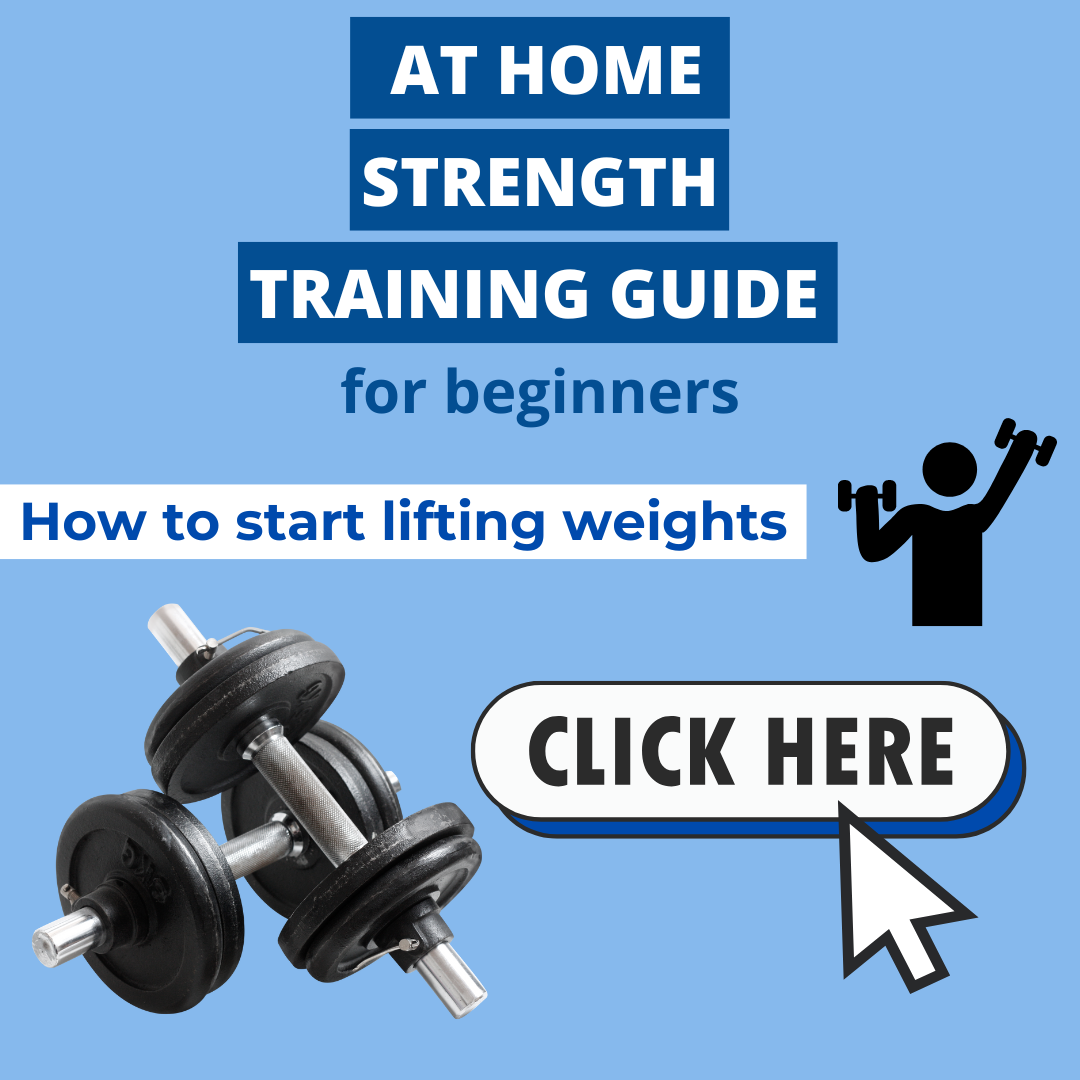




0 Comments